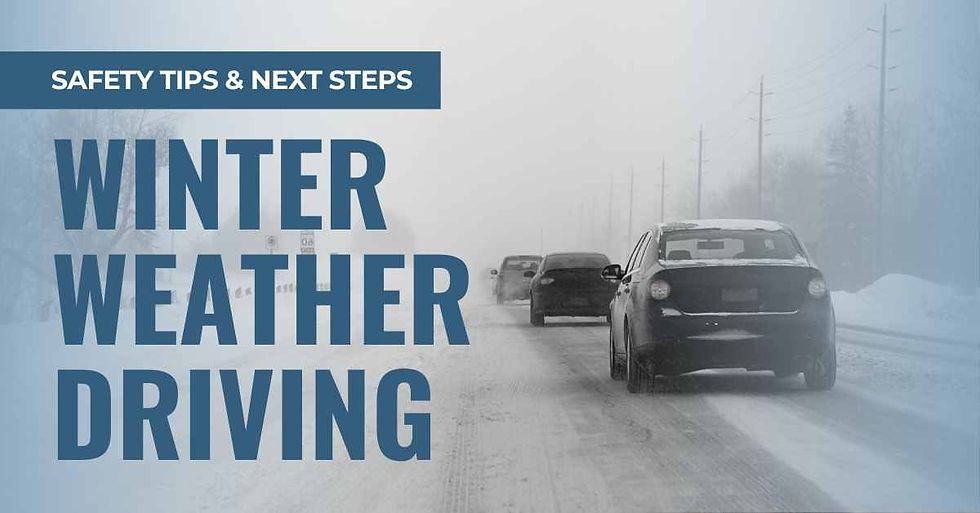Winter Weather Driving | Tips for Accidents
- Dec 15, 2021
- 3 min read
Updated: Dec 12, 2024

Pennsylvania is known for having severe winter weather, often resulting in treacherous road conditions for motorists. Winter weather can affect vehicle performance and driver visibility, sometimes resulting in serious accidents. Here are some of the most common weather conditions that contribute to car accidents in the Pennsylvania area.
Car Accidents Caused by Snow
The Pennsylvania area receives about 20 inches of snow accumulation annually, enough to expect several days per year when local drivers must contend with snow-covered streets and highways. The PennDOT winter travel guide offers good advice about the precautions drivers should take in winter conditions.
Any of the following driving behaviors on a snow-covered road could constitute negligence and may lead to accidents:
Following too close to the car ahead
Making sudden stops and starts
Using cruise control
Failing to remove snow from windshields, windows, and mirrors
Failing to remove snow from car surfaces, such that it flies off and blinds other drivers
Car Accidents Caused by Ice
Like snow, ice is another winter weather driving condition in Pennsylvania that can lead to catastrophic accidents. In fact, ice may present even more dangers than snow because drivers may sometimes have difficulty spotting it. Roadways that look wet but are actually frozen - a condition commonly called black ice - results in some of the worst accidents on local roads.
Anyone who has ever hit a patch of black ice knows it’s scary. Even at low speed, a driver can lose control of a car. When black ice contributes to a motor vehicle accident, the question to ask is whether he or she was ignoring the danger of icy roads altogether and driving on a black ice-covered street as if it’s just a little wet. Whenever temperatures hover around freezing and roads are wet, ice is a concern. A driver who fails to exercise extreme caution in those conditions may be acting negligently.
Tips for Winter Driving
Ice on the roads brings unique challenges for all drivers. Black ice in particular can be extremely dangerous, as it’s basically invisible so you won’t know you’re driving on it until you hit it. While avoiding driving on icy roads altogether is generally recommended, there are a few things to keep in mind should you get stuck out there during a winter storm:
Stay calm. Panicking when you’re driving in dangerous conditions is not going to help your situation. Try to keep your cool, take a few deep breaths, and keep your eyes open and your hands on the wheel.
Properly prep your vehicle. Before driving in winter weather, make sure to clear your vehicle of any snow and ice so you can see out of every window. Keep your gas tank at least half full, and bring along proper winter gear including gloves, a hat, and a blanket in case of any emergencies.
Pump your brakes. Try to avoid sudden movements when you hit an icy spot, and this includes accelerating and/or jamming on the brakes. Hitting the brakes too forcefully will cause the car to slide, and you can easily lose control of the vehicle when that happens.
Turn into a slide. Sometimes sliding on icy roads is unavoidable. If you feel your vehicle sliding or fishtailing, slow down by gently reducing your speed as mentioned above. Turn the wheel in the direction the rear of the car is sliding, keeping your eyes on where you want the car to go so your hands on the wheel follow them.
Avoid hills and bridges. Plan your route accordingly by avoiding dangerous areas like hills and bridges. There will be no way to stop yourself from sliding down an icy hill, as gravity will be working against you in this case! Also, remember that bridges and overpasses tend to freeze faster than other roads, even when they’ve been treated with salt.
Be cautious of other drivers. You might feel confident enough to drive on icy roads, but others out there may not. Always stay alert and aware of those around you, keeping a safe distance away from other vehicles at all times.
Filing a Car Accident Lawsuit After a Bad Weather Car Accident
When these accidents are the result of driver carelessness or negligence, victims may be able to recover by filing a personal injury lawsuit against the person or party responsible for their injuries.
Proving negligence in a car accident case that occurs in bad weather can be a complicated issue, so it is advisable for those considering bringing a personal injury claim to consult with an experienced Pennsylvania personal injury attorney as soon as possible after an accident. Schedule a free consultation today to get your personal injury case started.


